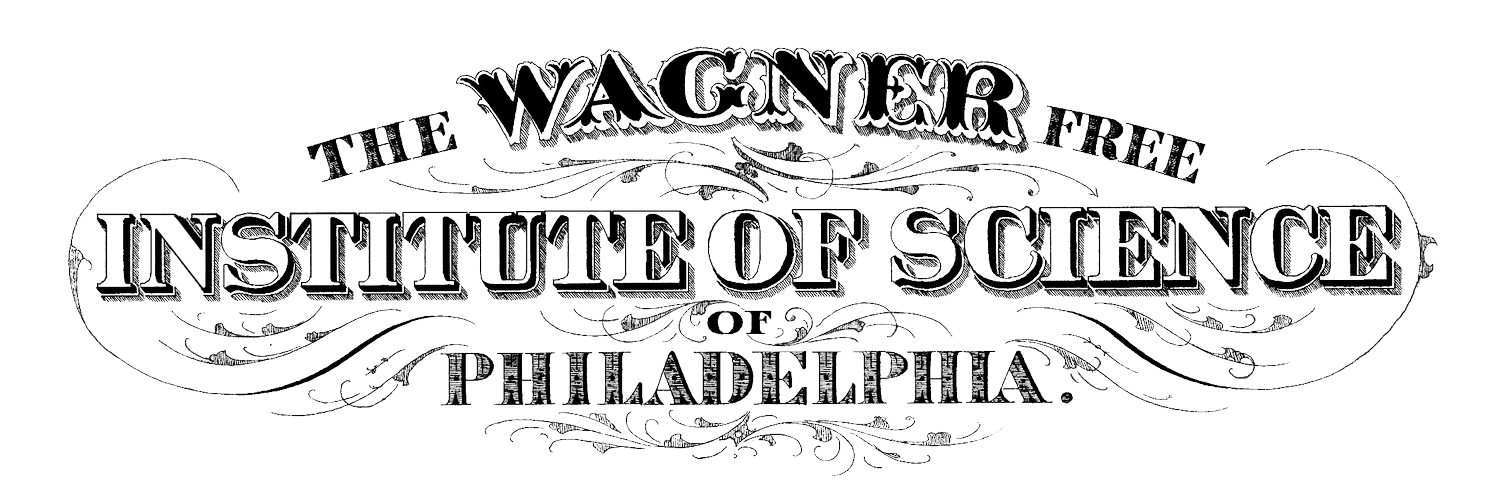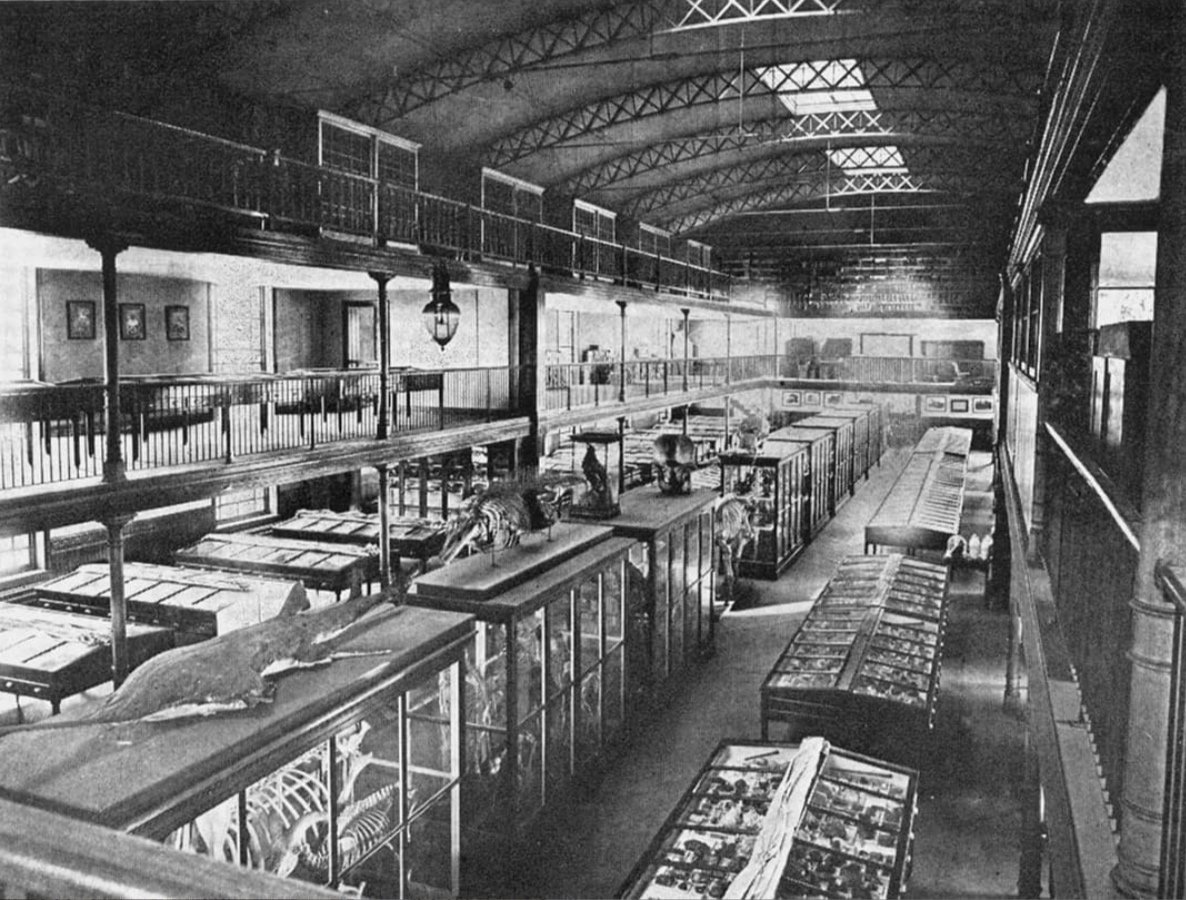About the Wagner
The Wagner Free Institute of Science is a rare survival—a museum and educational institution that remains nearly unchanged from the nineteenth century in both the arrangement of its specimens and in its mission. Its public courses in science represent the oldest program devoted to free adult education in the United States. In recognition of the importance of this free education mission and of its contributions to science education and research, the Institute was designated a National Historic Landmark by the United States Department of the Interior in December of 1990.
THE BEGINNING | Formally incorporated in 1855, the Institute had its inception in a public lecture series begun in the early 1850s by founder William Wagner (1796-1885), a noted Philadelphia merchant, philanthropist, gentleman scientist, and lifelong collector of natural history specimens. Believing strongly that education in the sciences should be available to everyone, Wagner began offering free lectures on science at his home, Elm Grove, a colonial farm estate then on the outskirts of the city. To illustrate the lectures, he drew on the vast collection of specimens he had gathered since his childhood, including many he had acquired during the years he spent traveling around the world as an agent for the well-known Philadelphia financier Stephen Girard. These lectures became so popular that by 1855 he moved them to a public hall on Spring Garden Street to accommodate the rapidly growing audience. He also appointed a faculty to teach six evenings a week on subjects ranging from paleontology and chemistry to botany and architecture. All the classes were offered free of charge with an open admission policy that allowed women as well as men to attend.
Based on the success of earlier lectures, in 1859 Wagner began construction on a building that would become the permanent home for his collections and his educational program. Designed by Philadelphia architect John McArthur, Jr., who later designed City Hall, the building was completed and opened to the public in 1865.
THE LEIDY ERA | Wagner continued to lecture and lead the unique institution he had founded until his death in 1885. Direction then passed to a Board of Trustees who appointed Dr. Joseph Leidy (1823-1891), a biologist of international reputation, to head its scientific and educational programs. Joseph Leidy’s appointment ushered in an active and productive era in which the Institute’s mission and programs were greatly expanded. He invigorated the public lectures by retaining some of the most noted scientists and explorers of the day for the faculty. Leidy also added original scientific research to the Institute’s programs and organized its earliest field expeditions. The results of this work were published in the Institute’s own publication, The Transactions of the Wagner Free Institute of Science.
Leidy’s most lasting and significant contribution to the Institute, however, was his reorganization of the museum. Wagner’s original collections had been greatly enlarged by specimens collected in the field and through purchases and acquisitions. Leidy personally developed and supervised their reorganization into a systematic display in which specimens and cases were arranged so that visitors and researchers moved from simpler to more complex organisms and through geologic time as they walked through the exhibition hall. This new display opened in 1891 and little has been altered since Leidy’s time, making the Institute an exceptional example of a Victorian science museum.
THE 20TH CENTURY & BEYOND | By the turn of the century, the Institute was a leading force in public education in Philadelphia. It was an early participant in the groundbreaking University Extension movement in the city and in 1892, the Institute opened the first branch of the Free Library of Philadelphia. Owing to heavy usage of the library, in 1901 the Institute added a west wing to its building for use by the Free Library.
Today, the Wagner Free Institute of Science is widely recognized as one of Philadelphia’s historic treasures. It is committed to preserving its historic building and collections for future generations as itcontinues to serve as a rich educational resource in science, natural history, and the history of science. Through its wide variety of programs – including the free museum, field trip visits, public lectures, evening courses, library and archives, and community school partnerships – the Wagner serves a broad audience in Philadelphia and beyond. In recognition of Wagner’s legacy of free education, Philadelphia City Council presented it with the 2011 Councilman David Cohen Award for outstanding commitment to social and economic justice.
Hours & Directions
We are open:
Tuesday through Friday
9:30am to 4:30pmThe 1st Saturday of the month from 12 to 4pm (September through June)
The Museum will be closed to visitors on the followings days:
July 4, 2023
August 7 - 18, 2023
November 9 - 10, 2023
November 22 - 24, 2023
December 22 - 26, 2023
January 1, 2024
Directions:
Located at: 1700 West Montgomery Avenue, between North 17th Street & North Bouvier Street
By car: The Institute is a few block from Broad Street, right by Temple University. There is no parking lot but street parking is available on Montgomery Avenue and 17th Street, which is free. There is metered parking available on Bouvier Street and Cecil B. Moore.
By train: The Broad Street subway (Orange Line – local train only) stops at Temple University/Cecil B. Moore Avenue
By bus: Bus Route 2 at the 16th Street and Montgomery Avenue stop
Our Staff
Susan Glassman,
Executive Director
(She/Her)
Holly Clark,
Director of Children’s Education
(She/Her)
Lynn Dorwaldt,
Special Collections Librarian
(She/Her)
Cris Juarez,
Museum Educator
(They/Them)
Don Azuma,
Site Manager
(He/Him)
Jacob Yakira,
School Partnership Manager
(He/Him)
Kelly Tarnovski,
Development Manager
(She/Her)
Liz Amber
SNAP Coordinator
(She/They/He)
Our Board
Trustees and Directors
Peter Burwasser, President
James D. McCambridge, PhD, Vice President
Boyd Petterson, Secretary
Randolph K. Brock, Treasurer
Alexandra Bak-Boychuk, Esq.
Frances Batzer Baylson, MD
Cathy Berry
Darren R. Black, PE
Henry Disston, Jr.
Katherine A. Dowdell
Regi George
Christine E. Hartzell
Karen Spencer Kelly, Esq.
Philip E. Lian
Patricia A. McCausland, Esq.
Sean McHose
William J. Meagher, Jr.
Ryan F. Poyser
Louis Thompson
Past Presidents
Vivian Wagner Gast
Laura Foster
Dianne S. Salter, PhD, Esq.
Frank M. Stearns, PhD
Philip H. Wagner
Anne Hollingsworth Arfaa
Advisory Council
Craig E.F. Alston, Esq.
Bonnie Bassler, PhD
Phillip Brooks
David B. Brownlee, PhD
Lois S. Cronholm, PhD
Peter Dodson, PhD
Kenneth Finkel
Vivian Wagner Gast
Scott F. Gilbert, PhD
Eduardo D. Glandt, PhD
Catharine Hawks
Lynn Hitschler
Sam Katz
Don Lessem
Martin L. Levitt, PhD
Robert McCracken Peck
Polly McKenna-Cress
Sharon Pinkenson
Derrick Pitts, HonD
Hon. Blondell Reynolds Brown
Hugh A. A. Sargent, Esq.
Kenneth Scott, HonD
Denise Scott Brown
Elliott Shore, PhD
Linda Tabas Stempel
Hon. Sharif Street
John Whitenight















